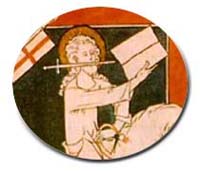Forgotten Truths
 |
 |
 |
 |
 |
 |
 |
The Fatal Danger of Abusing God’s Mercy
Today it is common to hear about the unlimited mercy of God, often giving the impression that God’s forbearance has no limit. This is not what the Great Doctor of the Church St. Alphonsus de Ligouri taught.
In his sermon on the First Sunday of Advent, the Founder of the Redemptorists warned the faithful that man must not presume on God’s mercy and imagine there is always time to repent and be saved. God’s mercy has limits, which are demanded by His wisdom and justice.
In his sermon on the First Sunday of Advent, the Founder of the Redemptorists warned the faithful that man must not presume on God’s mercy and imagine there is always time to repent and be saved. God’s mercy has limits, which are demanded by His wisdom and justice.
St. Alphonsus of Ligouri
In this day's Gospel, we read that, having gone into the desert, Our Lord Jesus Christ permitted the Devil to set Him on the pinnacle of the Temple and say to Him: ”If Thou be the Son of God, cast thyself down, for the Angels shall preserve Thee from all injury.” But the Lord answered that in the Sacred Scriptures it is written: Thou shalt not tempt the Lord thy God.
The sinner who abandons himself to sin without striving to resist temptations, or without at least asking God's help to conquer them, and hopes that the Lord will one day draw him from that abyss, tempts God to work miracles, or rather to show to him an extraordinary mercy not extended to the generality of Christians.
As the Apostle says, God “will have all men to be saved” ( I Tim. 2: 4), but He also wishes us all to labor for our own salvation, at least by adopting the means of overcoming our enemies and of obeying Him when He calls us to repentance.
Sinners hear the calls of God, but they forget them and continue to offend Him. But God does not forget them. He numbers the graces which He dispenses, as well as the sins that we commit. Hence, when the time that He has fixed arrives, God deprives us of His graces and begins to inflict chastisement. I intend to show in this discourse that when sins reach a certain number, God pardons no more. Be attentive.
The number of sins God will pardon is fixed
1. St. Basil, St. Jerome, St. John Chrysostom, St. Augustine and other Fathers teach, that just as God has fixed for each person the number of the days of his life, and the degrees of health and talent that He will give him - according to the words of Scripture, “Thou hast ordered all things in measure, and number, and weight” (Wis. 11: 21) - so also He has determined for each the number of sins that He will pardon. And when this number is completed, He will pardon no more.
2. “The Lord hath sent me to heal the contrite of heart” (Is 61: 1). God is ready to heal those who sincerely wish to amend their lives, but cannot take pity on the obstinate sinner. The Lord pardons sins, but He cannot pardon those who are determined to offend Him.
Nor can we demand from God a reason why He pardons one a hundred sins, and takes others out of life and sends them to Hell after three or four sins. By His Prophet Amos, God has said: “For three crimes of Damascus, and for four, I will not convert it” (1:3). In this we must adore the judgments of God, and say with the Apostle: “Of the depth of the riches, of the wisdom, and of the knowledge of God! How incomprehensible are His judgments” (Rom 11: 33).
He who receives pardon, says St. Augustine, is pardoned through the pure mercy of God; and they who are chastised, are justly punished. How many has God sent to Hell for the first offense? St. Gregory relates that a child of five years, who had arrived at the use of reason, was seized by the Devil and carried to Hell for having uttered a blasphemy.
The Blessed Mother of God revealed to a great servant of God, Benedicta of Florence, that a boy of 12 years was damned after the first sin. Another boy of eight years died after his first sin and was lost.
You say: I am young; there are many who have committed more sins than I have. But is God on that account obliged to wait for your repentance if you offend Him? In the Gospel of St. Matthew (21: 19), we read that the Savior cursed a fig tree the first time He saw it without fruit. “May no fruit grow on thee henceforward forever. And immediately the fig tree withered away.” You must, then, tremble at the thought of committing a single mortal sin, particularly if you have already been guilty of mortal sins.
Continued

(Alphonsus Liguori, Sermons for All the Sundays in the Year,
London: James Duffy & Sons, 1882, pp. 112-113)
London: James Duffy & Sons, 1882, pp. 112-113)
Posted January 11, 2014












